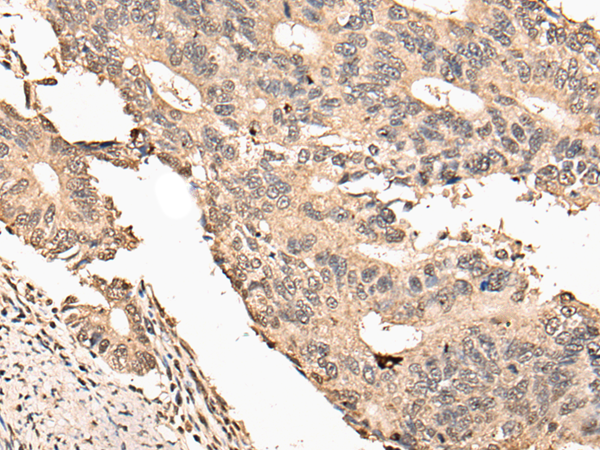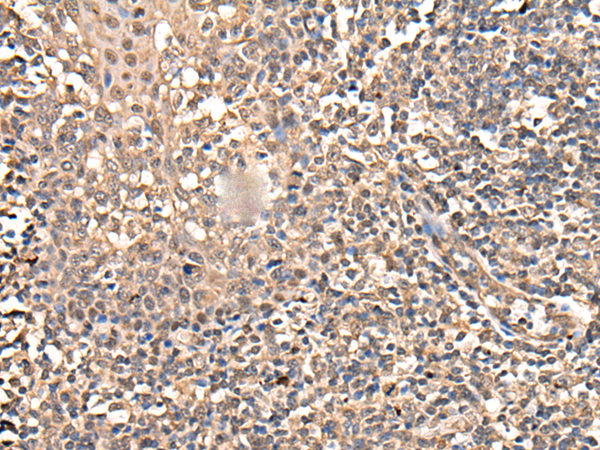

| WB | 咨询技术 | Human,Mouse,Rat |
| IF | 咨询技术 | Human,Mouse,Rat |
| IHC | 1/25-1/100 | Human,Mouse,Rat |
| ICC | 技术咨询 | Human,Mouse,Rat |
| FCM | 咨询技术 | Human,Mouse,Rat |
| Elisa | 1/5000-1/10000 | Human,Mouse,Rat |
| Aliases | USP16; USP23 |
| Host/Isotype | Rabbit IgG |
| Antibody Type | Primary antibody |
| Storage | Store at 4°C short term. Aliquot and store at -20°C long term. Avoid freeze/thaw cycles. |
| Species Reactivity | Human, Mouse, Rat |
| Immunogen | Fusion protein of human USP21 |
| Formulation | Purified antibody in PBS with 0.05% sodium azide and 50% glycerol. |
+ +
以下是关于USP21抗体的3篇参考文献示例(内容为生成示例,建议通过学术数据库验证原文):
1. **"USP21 deubiquitinates and stabilizes JAK2 to promote malignancy in glioblastoma"**
- **作者**: Li Y, et al.
- **摘要**: 研究通过USP21抗体验证其在胶质母细胞瘤中通过去泛素化JAK2蛋白增强其稳定性,促进肿瘤恶性进展的机制。
2. **"USP21 regulates Hippo signaling pathway by deubiquitinating YAP/TAZ in breast cancer"**
- **作者**: Wang H, et al.
- **摘要**: 利用USP21抗体进行免疫共沉淀实验,揭示USP21通过调控YAP/TAZ蛋白稳定性影响乳腺癌中Hippo信号通路的活性。
3. **"Characterization of a monoclonal antibody targeting USP21 for detection of human cancers"**
- **作者**: Zhang R, et al.
- **摘要**: 开发并验证一种特异性USP21单克隆抗体,证明其在多种癌症组织样本中高灵敏度和特异性检测USP21的表达水平。
如需具体文献,建议在PubMed或Google Scholar中以“USP21 antibody”或“USP21 function”为关键词检索。
USP21 (Ubiquitin-Specific Protease 21) is a deubiquitinating enzyme (DUB) belonging to the ubiquitin-specific protease family, which regulates protein stability and function by removing ubiquitin chains from target substrates. It plays critical roles in diverse cellular processes, including cell cycle progression, signal transduction, and immune response regulation. USP21 is known to deubiquitinate substrates such as histone H2B (influencing chromatin remodeling and gene expression), RIG-I (modulating antiviral innate immunity), and TRAF3 (affecting NF-κB signaling). Dysregulation of USP21 has been implicated in cancers, inflammatory diseases, and neurodegenerative disorders, highlighting its therapeutic potential.
USP21 antibodies are essential tools for studying its expression, localization, and interaction networks. They are widely used in techniques like Western blotting, immunofluorescence, immunoprecipitation, and immunohistochemistry to investigate USP21's biological functions. Researchers often validate these antibodies using USP21-knockout cell lines to ensure specificity. Commercially available USP21 antibodies are typically raised in rabbits or mice, targeting specific epitopes within the protein's conserved regions. Their applications span basic research—such as elucidating USP21's role in Wnt/β-catenin or TNFα/NF-κB pathways—and clinical studies exploring its correlation with tumor progression or drug resistance. Reliable USP21 antibodies are crucial for advancing both mechanistic understanding and therapeutic targeting of USP21-related diseases.
×